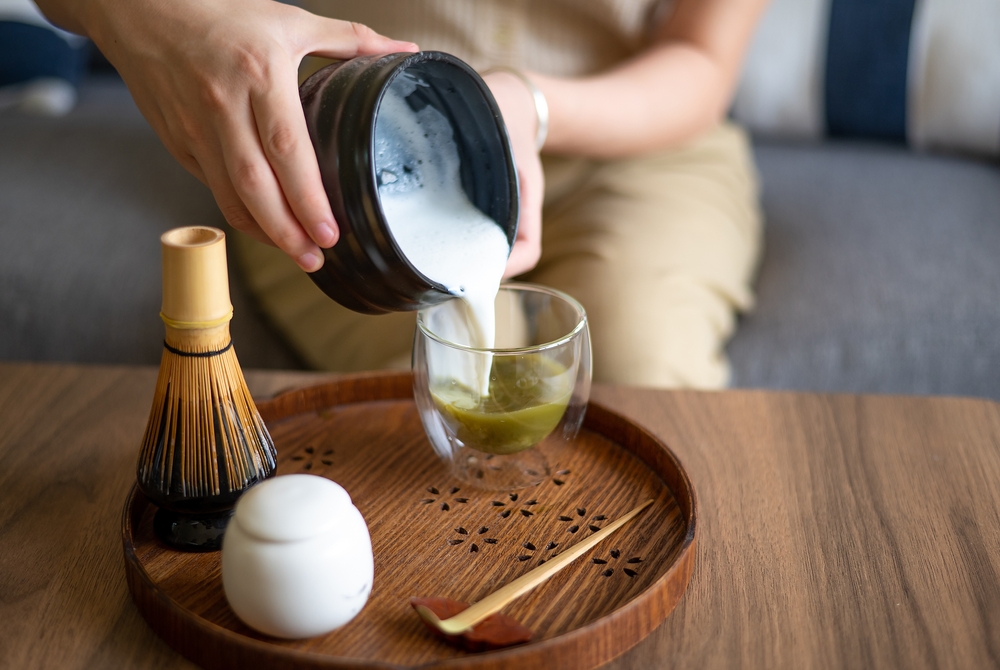Matcha tea, also known as green tea, was brought from China to Japan 800 years ago and was originally used as a form of medication for calming the nervous system, increasing concentration, digestive upset, and more. Since then, matcha tea has evolved quite a lot.
Despite the fact that it’s been around for centuries, matcha tea is rising in popularity right now. For instance, you can now grab a matcha green tea latte at almost every coffee shop.
According to recent data, there’s a boost in demand for matcha tea in the US, and that’s definitely because more and more people have started to be aware of matcha’s benefits.
But what exactly makes matcha tea such a healthy drink? Let’s see!
What is matcha?
When ground up, the green tea leaves turn into matcha, a vibrant green powder. Keep in mind that this isn’t the same as typical green tea. Basically, there are two rules you have to follow if you want to make your own matcha. Rule #1: You don’t make matcha tea the same as green tea. Rule #2: whisk the powder with hot water. That’s it!
Matcha contains many components that synergistically work together to provide lots of health benefits. It provides the same health benefits as typical green tea but is possibly supercharged. It’s packed with high amounts of antioxidants, such as polyphenols and flavonoids, which boost the immune system, cognitive function, and circulatory system.
Matcha also boasts other health-promoting compounds, including caffeine, rutin, chlorophyll, and quercetin.
One gram of matcha powder provides a bit of vitamin C, K, and A, plus fiber and iron.
In other words, matcha is a nutritious, healthy, low-calorie beverage — unless you turn it into a delicious dessert.

May Support Brain Health
Various active compounds in matcha, including catechins, may play a major role in improving mental clarity.
A double-blinded, placebo-controlled study published in Nutrients in 2020 shows that a daily beverage containing 3 grams of matcha powder seems to help guard against cognitive issues. However, the effects were only seen in the women.
Beyond catechins, there’s also an amino acid found in matcha powder that’s helpful. Its name is L-theanine, and it helps improve concentration while lowering stress levels in the body. As a result, drinking matcha tea induces relaxed alertness without the sudden crash of energy or jitteriness from drinking coffee.
Also, according to a 2019 review, green tea intake may reduce the risk of dementia, Alzheimer’s disease, and cognitive impairment (even if mild).
May Enhance Immunity
Matcha tea may boost your immune system, which can help you keep viruses and infections at bay.
The antioxidants found in matcha powder are essential to its immune-enhancing benefits, ranging from antiviral to antibacterial properties. It’s packed with flavonoid rutin, which provides support for the immune system while offering anti-inflammatory and antioxidant properties.
Matcha is also high in vitamin C, which is known to help build up your immune defenses. Several studies, including a Phytotherapy Research study published in 2019, suggest that the L-theanine that is found in green tea may promote good immune functioning.
In other words, you may want to give it a try this winter. Not only is it nutritious, but also delicious!
May Help Prevent Cancer
Drinking a cup of matcha daily won’t slash cancer, but there’s still some bright news.
According to professional experts, matcha tea has certain antioxidant properties that may help protect against certain cancers. Green tea, in general, provides an anti-angiogenesis effect, which suggests that it may halt cancer growth.
Does this mean that matcha may help prevent breast cancer? A 2018 laboratory analysis found that matcha powder may be able to manage changes within cancer cells, therefore, it does provide some anticancer potential.
Other 2019 laboratory-based research also suggests that the quercetin and EGCG found in green tea provide a potential anticancer effect, especially on breast cancer cells that are estrogen receptor-negative and positive.

May Help Weight Management
While there is no magic formula for losing weight, drinking matcha tea can definitely be part of a healthy weight plan.
According to Nancy Farrekk Allen, registered dietitian nutritionist, “Matcha could be beneficial for weight loss or weight management, as it may boost metabolism, allowing your body to burn more fat”.
Studies in animals and humans indicate that this may be possible — and the catechin found in green tea may hold the answer.
In a double-blinded, placebo-controlled clinical trial, 115 obese women were given a daily high dose of green tea extract (856.8 milligrams). Here’s the result: reduced waist circumference, some weight loss, and lower total and bad cholesterol levels.
The researchers may have an answer to that: ghrelin secretion — which is “the hunger hormone” — may be inhibited by the tea extract. And this could also be the reason why green tea is associated with an anti-obesity effect.
May Reduce the Risk of Cardiovascular Disease
Drinking matcha tea may be good for your heart. It naturally has lots of antioxidants, which may help you to sidestep several chronic diseases, including cardiovascular disease.
According to a research review published in 2019 in the journal Antioxidants, bioactive components found in matcha tee may provide protection against heart disease due to their potential ability to reduce oxidative stress, raise HDL cholesterol, lower bad cholesterol, and triglycerides, lessen inflammation, and more.
Based on a meta-analysis of several controlled trials, green tea appears to have a great ability to lower both diastolic and systolic blood pressure. At least, that is what clinical trials have found by now.
May Help Manage Blood Sugar
Consuming green tea is linked with a lower risk of developing type 2 diabetes. And it may also lower blood sugar and A1C levels — your average levels of blood sugar over the past 3 months.
According to some healthcare experts, matcha tea can be part of a diabetes-friendly diet. That’s because green tea may positively affect those with diabetes who follow a treatment plan. There are two key plant components found in matcha that may be useful for people with diabetes: quercitin and rutin.
Rutin has both anti-inflammatory (that is, it may protect against or prevent diabetes-related complications) and antidiabetic properties that may prevent high blood sugar. Also, quercitin has been shown to help our body normalize the digestion of carbohydrates.
Now, it’s worth mentioning that none of this matters if you’re drinking your matcha tea with lots of sugar, sweeteners, and milk. In this situation, the carb content will nullify any possible blood-sugar-lowering effects of the matcha.

May Promote Bone Health
Aging can affect your bones. Fortunately, green tea antioxidants may provide potential protection against bone loss and the risk of bone fracture.
According to a 2020 study, this osteoprotection is due to catechins that are found in matcha. In fact, matcha boasts high levels of these wonderful compounds. Due to their antioxidant and powerful anti-inflammatory properties, catechins may be able to fight against the negative effects of osteoporosis.
While more human studies are needed to determine the matcha’s ability to prevent and protect against bone loss, it seems that when consumed in regular and sufficient amounts, Japanese green tea is effective.
May Slow Down the Aging Process
The catechins found in matcha may be your body’s next best friend, as several studies found that these compounds prevent premature aging. Now, aging doesn’t mean just wrinkles and gray hairs. There are many ways your body will feel and show its age, including the health of your bones and skin and how long you live.
High antioxidant-rich foods, matcha tea included, are thought to slow the aging process by helping to restore damaged DNA, inhibiting mutation of DNA, and preventing oxidation. For instance, UV rays cause DNA damage, which can lead to skin cancer. Well, matcha may be able to reduce the risk of it.
You may also enjoy: 6 Surprising Foods That Sabotage Your Metabolism.







